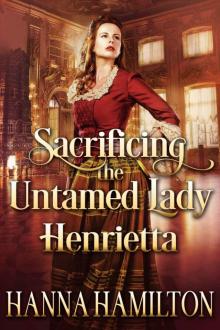- Home
- Hamilton, Hanna
Charity Falls for the Rejected Duke: A Historical Regency Romance Novel
Charity Falls for the Rejected Duke: A Historical Regency Romance Novel Read online
Charity Falls for the Rejected Duke
A Historical Regency Romance Novel
Hanna Hamilton
Edited by
Maggie Berry
Contents
A Thank You Gift
Chapter 1
Chapter 2
Chapter 3
Chapter 4
Chapter 5
Chapter 6
Chapter 7
Chapter 8
Chapter 9
Chapter 10
Chapter 11
Chapter 12
Chapter 13
Chapter 14
Chapter 15
Chapter 16
Chapter 17
Chapter 18
Chapter 19
Chapter 20
Chapter 21
Chapter 22
Chapter 23
Chapter 24
Chapter 25
Chapter 26
Chapter 27
Chapter 28
Chapter 29
Chapter 30
Chapter 31
Chapter 32
Chapter 33
Chapter 34
Chapter 35
Chapter 36
Chapter 37
Chapter 38
Chapter 39
Chapter 40
Chapter 41
Chapter 42
Chapter 43
Epilogue
Extended Epilogue
The Obscure Duchess of Godwin Hall
Chapter 1
Chapter 2
Chapter 3
Chapter 4
Also by Hanna Hamilton
About the Author
A Thank You Gift
Thanks a lot for purchasing my book. It really means a lot to me, because this is the best way to show me your love.
As a Thank You gift I have written a full length novel for you called A True Lady. It’s only available to people who have downloaded one of my books and you can get your free copy by tapping this link here.
Once more, thanks a lot for your love and support.
Hanna Hamilton
About the Book
When Charity Miller, the young and beautiful daughter of the town’s most respected vicar is being pressured to marry a man she doesn’t love, her life slowly turns into a nightmare.
Charity feels trapped until a mysterious man from the past suddenly returns home. The powerful Duke of Mornington banished Adam - his very handsome, only son - by accusing him of a terrible crime he never committed.
With the clock ticking and his dukedom being under the threat of extinction, Adam must not only save his relationship with the only woman he ever loved but also uncover the painful truth of that day’s dreadful event.
A truth, though, that comes with unprecedented consequences...
Chapter 1
“Unforgivable.”
The child stared at his handprints on the cream-colored skirt. He bit his bottom lip and eyes widened as he looked up to face the lady whose skirt he just muddied. The young lady smiled, leaned forward and kissed his forehead. He was relieved.
“With that said, perhaps I shall have to reconsider, for how could I possibly refuse to forgive a face like that? Do not worry, dearest, I do not really mind.”
The little boy’s eyes brightened and the young woman laughed. Once he felt assured there actually was nothing to concern himself with, he too began to laugh.
Miss Charity Miller straightened up and bade the child run along. When she was satisfied that his attention had been diverted, she looked down at her skirt and shook her head — for what else was there to do?
How could she be cross with the neighbor’s little boy when he had run to greet her with such excitement, getting dirt all over her in the process? There would be other dresses, after all, and she took more pleasure in the devotion of a little child than she could in any dress.
Charity straightened, and as she always did when deep in daydreaming, she cast her eyes toward the dense lines of trees that defined the horizon beyond the vicarage garden.
Coming over the brow of the hill, she could just make out the silhouette on horseback. She couldn’t recognize the figure with any clarity, but she could tell from the grace of the rider’s bearing, that it was not some common farmer out riding on his nag.
She narrowed her eyes in the early morning light, honing in on the mounted figure and struggling to understand what about him seemed familiar.
She could not make sense of the thought. She could only acknowledge it was déjà vu and repeated the same word that sprang once again to her lips.
“Unforgivable,” she murmured, though she could not reason why, and the bright smile faded from her lively, expressive features. She could not say what it was about the sight of the horse and rider that cast a shadow over her heart. Only that the sight of it brought her the feeling that a reckoning was underway.
Chapter 2
Mr. Adam Harding had no notion of what to expect when he arrived at Lawley Hall.
Passing through the woods and groves in the early morning light, it struck him how very little had changed since he had last been at his ancestral seat. He had ridden these paths more times in his life than he could possibly number, and on that morning, it seemed he had never been away from the place at all.
The leaves on the trees were just beginning to shift from green to golden; the same way that they had done every year. It had been so since the days when he had run through the grounds as a boy or walked at his father’s side. The Duke of Mornington had pointed out the different trees and told Adam their names and taught him to recognize the different birds by the individual melodies of their songs.
As far as the trees were concerned, no change had taken place at Lawley Hall. Yet the weight that rested on Adam’s heart that morning made him feel as though those long walks had taken place in an entirely different lifetime.
The familiar chimneys and spires began to peer over the brow of the hill, and Adam urged the horse onward.
Then rising out of the mist, he saw his home. Or rather, he saw the place he left a year ago and promised he would never return.
As if I could ever really have stayed away. It felt bittersweet. As if anything could have kept me away.
In the time he had been abroad, he had at first defined his feelings toward his father as anger. It was only in recent months, when news of his father’s failing health had begun to reach him that Adam had acknowledged to himself what he had really felt on that fateful day when everything had been broken — seemingly beyond all prospect of repair— was a profound sense of hurt.
Those feelings came rushing up now, and he channeled them into urging his mount forward.
* * *
He was greeted at the door by the butler who scarcely knew what to do at the sight of him.
“Ah…good morning, my lord…sir…” the butler was clearly perplexed at how to address the young man who had once been destined as his future master.
The butler looked flustered, a sight which Adam had never seen in all his life. He presumed his father must have given some thunderous order a year or more ago, decreeing that his son never be permitted to cross the threshold of Lawley Hall again.
“Critchley,” Adam said, greeting the butler with a courteous nod. “Good to see you.”
He allowed the tinge of authority to enter his voice. The butler hastily stepped aside to allow Adam entry to the entrance hall, and there the two stood. Critchley clearly was unsure of what to say to Adam or to which room he ought to show him and see
med quite frozen in his state of panic.
Adam resisted walking past the man and imperiously demanding to see his father. He was trying to rein in his temper — one of the things about himself that he had endeavored so hard to change in the past year.
His dilemma was solved for him when a familiar voice rang out, “My dearest boy!”
There was only one person in this house who was accustomed to addressing him thus. Before he could turn around, Adam felt two elderly but strong arms fling around his neck. In the embrace of Mrs. Reynolds, the housekeeper of Lawley Hall and the closest figure he had ever had to that of a mother, he felt at once that he was home at last.
So, it had been Mrs. Reynolds who had written to him, and who had penned the entreating words that had cut through his previous anger and summoned him home.
He had taken care to ensure that she — and she alone — had a postal address to whatever far-flung place he traveled, but he had not expected that she would have to use that information for such a grave purpose. Mrs. Reynolds was a discreet woman, and Adam suspected that writing to him and entreating him to return to Lawley Hall had been the first act of insubordination in her immensely respectable life.
The second act was at this very moment when she was weeping unashamedly and embracing him.
She collected herself quickly, and Adam was moved to see tears continue to well up in her eyes even as she tried to hide them.
“I’m afraid the Duke is very bad, Mr. Adam, very bad indeed.” She addressed him in the same way she always had when he was a small boy. “I fear that you might not recognize him.”
The effect of her words hung in the air of the grand entryway of Lawley Hall. I did not recognize my father in the man who banished me from this house, though I fear not for the same reason that the poor lady is suggesting.
He said instead, “Will you take me to him, Mrs. Reynolds?” I feel that I had better know the worst for myself.”
Adam needed no guidance to the grand bedchamber where his father had always slept, but it was a comfort to him to make the walk there with Mrs. Reynolds at his side.
All around them, portraits of his ancestors peered down at him, wearing the same accusing expression that Adam had seen on his father’s face the last time that he had walked these halls.
I am guiltless, he reminded himself, as he so often had in the long and lonely days of his exile. I have not sinned, neither against my father nor against God. I have only my own conscience to answer to, and that is quite clean.
When he had received the letter from Mrs. Reynolds, he resolved that the time had come to return to his father and clear his name of the heavy assertion that hung his heart and tainted his reputation.
For months, he had wandered restlessly across the continent, wondering whether this banishment would last forever and force him to build a new life for himself in foreign lands.
But now, he hoped the time for redemption had come at last. And if redemption would not come to him, then he would seek it out for himself.
The door to the master bedchamber was open a crack; Adam could hear a dreadful wheezing sound, quite unlike anything he had heard before. So unfamiliar was the noise, that it did not even occur to Adam until he pushed open the door, it could possibly be emerging from his father.
The Duke of Mornington lay on the four-poster bed, wrapped in his various coverings and draperies. He was fully half the size of the enormous and imposing man that had always been Adam’s father, and his face seemed quite shrunken with illness and sorrow.
At the sight of his wretched father, Adam was at the bedside in a few swift strides and dropped to his knees to grasp his father’s hand.
“Dearest father.” His voice was warm and overwrought with the overwhelming feeling of homecoming. “I have come home to you, and I beg your pardon for having left you for so long.”
The words flew straight from his heart, and he did not speak them with any particular intention or agenda. Nonetheless, it seized and twisted at his heart to see his father flinch away from him and use what remnants of strength he had to turn his face away from his son.
“Father,” Adam said again. He was struck by the hollow sound of his own voice in that silent room. “Father, will you not at least look me in the eye?”
The old man did no such thing but kept his gaze fixed resolutely on the canopy of the bed as he spoke in a quavering voice that Adam scarcely recognized. “I have nothing to say to you, sir, nor do I recognize you as any relation of mine.”
He still believes it was me. This realization flooded Adam’s chest in a great wave of distress, and he reflexively released the hand that he had held in both of his.
How could my own father, my only family in all the world, honestly believe me to be guilty of such a terrible crime?
Adam rose to his feet. Suddenly, the room seemed stiflingly hot, and he wished to be outside, to be anywhere but in this place where his own father would not so much as look at him.
“I will not stay to cause you further distress, Father.” He struggled to keep his voice steady when his heart was still shaking with the pain of rejection. “I want you to know that I am here and that I will not leave your side so long as you need me.”
Perhaps he should have felt angered by his father’s rejection and advocated more weightily for his own innocence. But the sight of the old man looking so wasted and frail made anger impossible. Adam feared if he used any strong words then his father might physically break.
The old man continued to stare blankly at the velvet canopy above. Adam bent down to kiss the familiar hand — so wasted now — and left the room, pausing only to say over his shoulder, “I will come back soon, Father. I will not forsake you, no matter what you think of me.”
He meant the words sincerely. As he left the room, his mind was racing with only one question: How was he to prove his innocence to his father?
Chapter 3
Charity did not have many opportunities to spend much time alone.
There was always something that needed to be done at the vicarage — a household task to be attended to, a parishioner to take tea with or a neighbor’s child to be comforted. This meant that Charity enjoyed precious little time alone with her thoughts, which was a great pity to her because she enjoyed the pleasures of daydreaming above almost all other things.
Her one respite from the hum-drum existence of the vicarage was her daily walk, which she took every morning.
Being the daughter of a clergyman, Charity was perhaps more sharp of mind than most young ladies of her age and situation.
However, her native intelligence was counterbalanced by a great vivacity and lively sense of humour, which meant that despite her quick mind, she was perhaps not entirely suited to the life that her father had always envisaged for her — the life of a clergyman’s wife, as her mother had been before her. She had no real memories of her mother, but her father’s descriptions of her had featured the words ‘suffering’ and ‘duty’ very heavily.
Charity did not think a great deal about what she did or did not wish to be, or whom she hoped to marry. Her sole preoccupation was the thought of getting away from the stifling life at the vicarage, away from the demands of her father, away from the dreary and rigid expectations that were placed upon a clergyman’s elder daughter.
Charity’s daily walk gave her a small taste of this coveted liberty. However, the problem was that it left her hungry for more.
How dull the village looks, she thought, casting a glance over her shoulder at the little array of roofs, all surrounding the church spire. If only it would change, just a little. If only a little new life might be breathed into it.
So caught was she in her contemplation of the village where she had grown up, that she did not notice the presence of another, who was contemplating it too. It was only when she stepped upon a twig, and both parties started, that she realized that she was not alone in the grove.
There, standing not twenty feet away, was a young man
.
By his face and his bearing, Charity knew at once that he was no stranger, and yet for the life of her, she could not guess where she had seen him before. Though she was sure she recognized the features of the gentleman - and a gentleman he certainly was, judging from his clothing and the courtly manner of his bow.

 Charity Falls for the Rejected Duke: A Historical Regency Romance Novel
Charity Falls for the Rejected Duke: A Historical Regency Romance Novel The Scandalous Deal of the Scarred Lady: A Historical Regency Romance Novel
The Scandalous Deal of the Scarred Lady: A Historical Regency Romance Novel The Defiant Governess of Rosenhill Manor: A Historical Regency Romance Novel
The Defiant Governess of Rosenhill Manor: A Historical Regency Romance Novel Sacrificing the Untamed Lady Henrietta: A Historical Regency Romance Novel
Sacrificing the Untamed Lady Henrietta: A Historical Regency Romance Novel The Beauty and the Earl: A Historical Regency Romance Novel
The Beauty and the Earl: A Historical Regency Romance Novel The Hazardous Gamble of the Alluring Duchess: A Historical Regency Romance Novel
The Hazardous Gamble of the Alluring Duchess: A Historical Regency Romance Novel The Obscure Duchess of Godwin Hall: A Historical Regency Romance Novel
The Obscure Duchess of Godwin Hall: A Historical Regency Romance Novel Diaries of a Heartbroken Duchess: A Historical Regency Romance Collection
Diaries of a Heartbroken Duchess: A Historical Regency Romance Collection Diana Adores the Puzzled Duke: A Historical Regency Romance Novel
Diana Adores the Puzzled Duke: A Historical Regency Romance Novel